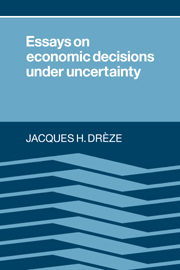Book contents
- Frontmatter
- Contents
- Acknowledgements
- Foreword
- I Decision-making under uncertainty: general theory
- 1 Axiomatic theories of choice, cardinal utility and subjective probability: a review
- 2 Decision theory with moral hazard and statedependent preferences
- 3 Logical foundations of cardinal utility and subjective probability
- 4 A paradox in information theory
- 5 Inferring risk tolerance from deductibles in insurance contracts
- II Markets and prices
- III Consumer decisions
- IV Producer decisions
- V Theory of the firm
- IV Human capital and labour contracts
- VII Public decisions
- Index
1 - Axiomatic theories of choice, cardinal utility and subjective probability: a review
Published online by Cambridge University Press: 01 October 2009
- Frontmatter
- Contents
- Acknowledgements
- Foreword
- I Decision-making under uncertainty: general theory
- 1 Axiomatic theories of choice, cardinal utility and subjective probability: a review
- 2 Decision theory with moral hazard and statedependent preferences
- 3 Logical foundations of cardinal utility and subjective probability
- 4 A paradox in information theory
- 5 Inferring risk tolerance from deductibles in insurance contracts
- II Markets and prices
- III Consumer decisions
- IV Producer decisions
- V Theory of the firm
- IV Human capital and labour contracts
- VII Public decisions
- Index
Summary
Most of the papers collected in this volume rely, explicitly or implicitly, upon (i) a formal description of uncertainty situations in terms of the concepts of events, acts and consequences; and (ii) an axiomatic theory of individual choices, which justifies the representation of preferences among acts by their expected utility.
The purpose of this introductory essay is to review these concepts and axioms against the background of their economic applications. The essay is not a systematic exposition of the theory (results will be stated without proofs); neither is it a survey of contributions to the theory (only a few key references will be used). Rather, it is a review of the main properties of the concepts and of the axiomatic theory, with a discussion of their usefulness and limitations in economic applications.
Section 1 provides an element of historical perspective. Section 2 reviews the concepts of events, acts and consequences. Section 3 reviews the axioms of a normative theory of individual choice under uncertainty and their main implication (the moral expectation theorem). Section 4 reviews some objections that have been raised against the normative appeal of the axioms. Section 5 is devoted to a general discussion of the usefulness and limitations of the theory. Section 6 relates the concepts of the general theory to those underlying economic applications presented elsewhere in this volume.
- Type
- Chapter
- Information
- Essays on Economic Decisions under Uncertainty , pp. 3 - 22Publisher: Cambridge University PressPrint publication year: 1987

